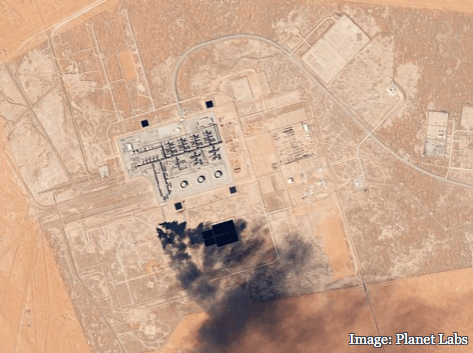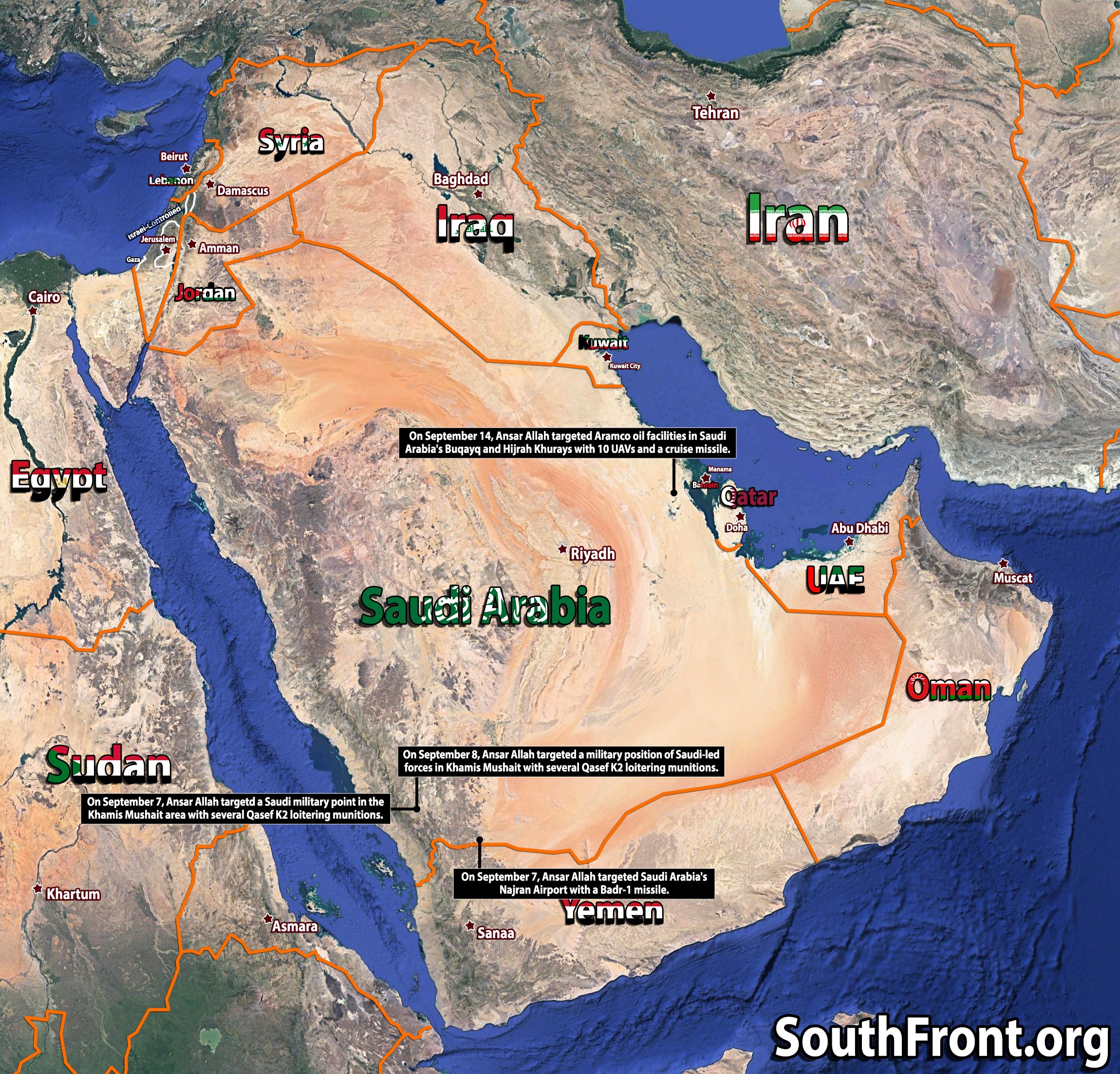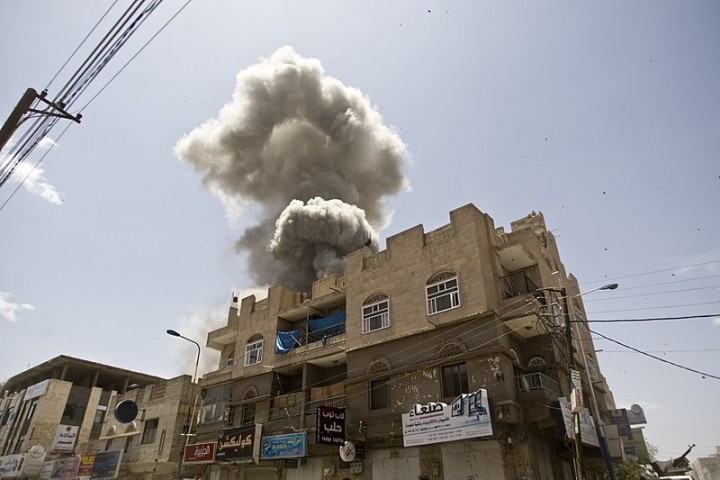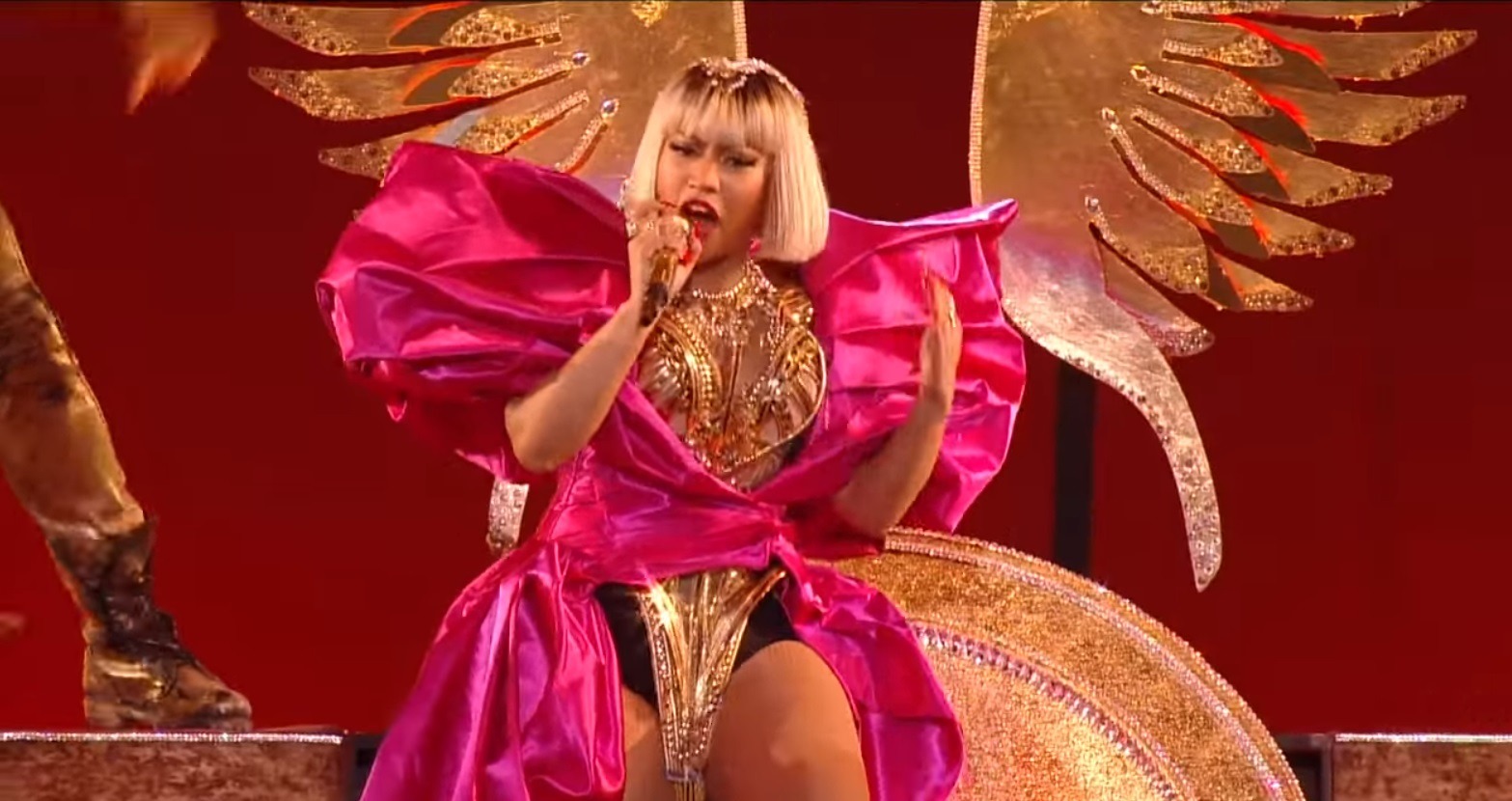Attacks on Saudi oil facility and the changing landscape of the Middle East
 Hamid Alizadeh
Hamid Alizadeh
MARXIST.COM
[dropcap]A[/dropcap] series of attacks on Saudi oil installations have set sparks flying once again in the Middle East. Only months after a last-minute cancellation of a US strike on Iran – and weeks after reaching out for talks without any preconditions – US President Donald Trump is yet again filling the twittersphere with threats and intimidation. Meanwhile, oil prices shot up by 20 percent and the ripple effects are already working their way through the sensitive oil and currency markets.
The attacks hit the world's largest oil processing plant in Abqaiq, Saudi Arabia – responsible for processing 70 percent of Saudi oil – as well as the Khurais oil field. The attack has left Saudi Arabia 5.7m barrels per day short of its previous daily oil output, which translates to 5 percent of overall global crude production.
Responsibility for the attack was claimed by the Yemeni Houthi movement, which has been locked in a bitter, four-and-a-half-year war with Saudi Arabia. In the past six months, the Houthis have increased their abilities to strike targets inside Saudi Arabia, hitting airports, oil pipelines and even reaching Riyadh with ballistic missiles. Nevertheless, the present attack is by far the most serious, striking the heart of Saudi Oil production.
Yesterday however, the Qatari-linked website, Middle East Eye, reported from an anonymous Iraqi intelligence source claiming that the attack was carried out by an Iranian-supported Iraqi Hashd al-Shaabi (Popular Mobilisation Forces – PMF) base in Southern Iraq. This follows a series of attacks on key PMF bases, convoys and weapons depots throughout Iraq. While these attacks were most probably carried out by Israel, they saw the collaboration of the US, as well as Saudi Arabia.
As the Iraqi intelligence source told Middle East Eye, this weekend's attack was a response to the attacks on PMF positions in August:
“The latest attack comes for two reasons: another message from Iran to the USA and its allies that, as long as their siege of Iran continues, no one will have stability in the region. However, the second, more direct reason is Iranian revenge for the recent Israeli attacks by drones launched from SDF-controlled areas in Syria against pro-Iranian Hashd bases.”
Whether it was Iraqi Shia or Yemeni forces who carried out the attacks; and even if Iran facilitated them, the US-backed Saudis have been the main aggressors in the region in the last period / Image: Fahd SadiUS and Saudi officials, have pointed the finger at Iran. US Secretary of State, Mike Pompeo tweeted that there was no evidence the weapons were launched in Yemen and accused Iran of “an unprecedented attack on the world’s energy supply.” Gulf princelings and official lapdogs have been howling all weekend about Iran’s supposed “bullying” in the region, saying they are ready to take any measures necessary.
But wait a minute, you may ask yourself, is it really Iran who are the main bullies in the Middle East? In the recent period alone, the Saudi regime has been stoking sectarianism throughout the whole region. It has also funded a barbaric sectarian war in Syria, which has so far destroyed the country as well as neighbouring Iraq. In Yemen, the Saudis have launched a one-sided war of slaughter, killing tens of thousands of people and keeping millions at the edge of starvation.
From the gold-embellished seats in lavish palaces, and from the back seats of armoured luxury cars, the country’s de facto ruler, Mohammed bin Salman, behaves like a child playing a computer game. He directs daily raids by swarms of state-of-the-art jets and bombers, supported by the US Reaper drones, reconnaissance planes and Naval forces. He orders thousands of precision-guided missile strikes to every corner of the Houthi-held areas, and commands mercenary armies full of Sudanese child soldiers, Yemeni Salafis and Moslem Brothers. With the violence that he has unleashed, he is keeping the poorest Arab country in a tight stranglehold.
On the other side of the conflict you have the Houthi movement, consisting of underweight men in bands of two-to-five, armed with AK-47s, grenades, Soviet-era vehicles and small rocket launchers. With Iranian assistance, the group has now developed homemade “ballistic missiles” and drone technology, which is equivalent to customising drones of the type that can be bought on Amazon in any Western country. Now, who are the defenders and who are the aggressors here?
The same points can be made about the rest of the US alliance in the Middle East. The Israeli army is one of the most-advanced militaries in the world and the only nuclear power in the Middle East. Its drones and F-35 jets fare unchallenged in Middle Eastern airspace, bombing anything they see fit. Just a few weeks ago, they bombed several Hezbollah offices in Beirut, as well as the aforementioned bombings, which took place throughout central and western Iraq. Their targets, Hezbollah and the Popular Mobilisation Forces, while better armed than the Houthis, are nowhere near the military strength of the Israelis.
And of course, all of this is backed by the US armed forces: the most powerful military in the world, which is – by the way – operating out of more than a dozen military bases and has more than 50,000 troops stationed in the Middle East, around 10,000 kilometers from US shores. The US plays a role in the war on Yemen, it was behind the war on the Assad regime, and it supports Israel’s attacks on targets throughout the region. Since Donald Trump became president, he has torn up the Iran nuclear deal and imposed crippling economic sanctions on the country, which (along with the Israeli-executed bombings) are part of the US’s “maximum pressure campaign, aimed at forcing Iran into submission.
So, whether it was Iraqi Shia forces or Yemeni forces who – in an act of retaliation and self-defence – carried out the attacks on Saudi Arabia, who can blame them? And if Iran facilitated this attack, which it probably did, so what? What we have in the Middle East is a low-intensity military conflict between, on the one hand, a bloc led by the strongest military power on the planet, which keeps pushing, provoking and upending the equilibrium; and on the other hand, a far-poorer and less-advanced country, supported by a network of militias. How is it acceptable for US imperialism and its allies to ravage and murder at will, but unacceptable when someone defends themselves?
Vulnerability of Saudi Arabia
In spite of all of the hypocritical hue and cry, the crisis brings to the surface for the first time a process that has long been brewing. After the fall of the Soviet Union and until the beginning of the new millennium, US imperialism appeared invincible. Unmatched in raw military power, it waded into one country after another, launching strikes, wars or pushing for regime change.
The Americans invaded Iraq and Afghanistan in quick succession, thinking this would be a swift affair. But in both countries, they suffered humiliating defeats and had to retreat (although they have still not managed to finish those retreats), with a trillion-dollar bill and mass opposition to war at home. Compounded by the general economic and political crisis in the US, the option of direct military interventions is therefore ruled out for a whole period.
At the same time, the Iraq War destroyed the Iraqi army, which had been used to keep Iran in check for two decades. In this power vacuum, the influence of Iran rose, as did Russia’s later. The most tangible result of this was the resounding defeat of US imperialism in Syria, where Iranian-supported groups now form the strongest force on the ground. Today, Iranian backed groups are also the strongest on the ground in Lebanon, Syria, Iraq and Yemen. This was the basis for the Iran nuclear deal, which was essentially a formalisation and recognition of Iran’s increased military weight in return for the Iranian regime’s collaboration with western imperialism, to stabilise the region.
 The weakness of the Saudi regime, and the reluctance of the US to intervene militarily in its aid, have been exposed for all to see / Image: PoR
The weakness of the Saudi regime, and the reluctance of the US to intervene militarily in its aid, have been exposed for all to see / Image: PoR
However, the Saudi and Israeli regimes regard the rise of Iran as a threat to their position as uncontested powers. In particular, the Saudi regime sees an existential threat in Iran’s increased strength. This is rooted in its historic weakness, being an artificial nation only kept together by US imperialism and oil money. Underneath all the pomp and ceremony lies a very fragile base of Royals, Islamic fundamentalist Wahhabis, tribes, ordinary Saudis, Shias and workers: all key constituents of the Kingdom, and all more-or-less bitter enemies of each other. This is the main reason that Saudi Arabia has never waged a ground battle with its own forces, because no force is loyal to the Royal family and the Kingdom. Despite having one of the most expensive military forces in the world, the Saudis would not stand a chance faced with the considerably-less-advanced Iranian army.
The Saudis have been pushing Trump to attack Iran, but the US is in no position to defeat Iran in open battle. Even airstrikes could have severe consequences for the US. As an Iranian commander reminded US officials yesterday, all US military bases within 2,000 miles of Iran would be within striking range of Iranian missiles. Last spring, the Saudis, along with now-former-Trump advisor John Bolton, were conspiring to push Trump to launch a war on Iran. But Trump backtracked at the last moment, even at the cost of much humiliation. Trump and the Pentagon realised that an attack on Iran holds many dangers for US imperialism, and would in any case not be able to achieve much more than a temporary setback for Iran’s military. Trump’s desire to reach a deal with Iran was the key reason behind his later split with Bolton.
Following countless provocations, sanctions and attacks on Iranian-supported groups in Syria, Lebanon and Iraq, Iran is drawing a line in the sand and showing the US and its allies what is at stake. Through a surgical strike, it has shown how easy it is – through its vast network of groups – to hit key facets of infrastructure, which are supposed to be highly secured by US-supplied missile defence systems.
 Furthermore, Iran is increasing pressure on the US, by calling its bluff. The truth is that, despite all the furore raised by Trump and Mike Pence and all the messages of solidarity they are sending to Saudi Arabia, their basic position has not changed. Trump was very careful when tweeting about the attacks, saying that “[We] are locked and loaded depending on verification, but are waiting to hear from the Kingdom [of Saudi Arabia] as to who they believe was the cause of this attack and under what terms we would proceed!” [our emphasis]. What he means by “under what terms we would proceed” is “which forces would you send along if you want us to attack Iran” – to which, of course, the Saudis have no answer.
Furthermore, Iran is increasing pressure on the US, by calling its bluff. The truth is that, despite all the furore raised by Trump and Mike Pence and all the messages of solidarity they are sending to Saudi Arabia, their basic position has not changed. Trump was very careful when tweeting about the attacks, saying that “[We] are locked and loaded depending on verification, but are waiting to hear from the Kingdom [of Saudi Arabia] as to who they believe was the cause of this attack and under what terms we would proceed!” [our emphasis]. What he means by “under what terms we would proceed” is “which forces would you send along if you want us to attack Iran” – to which, of course, the Saudis have no answer.
A military conflict with Iran would be an extremely risky affair for US imperialism – as well as for Saudi Arabia! The US will not come to the rescue of Saudi Arabia. Even if Trump carries out some symbolic attack (like the bombing of empty airfields in Syria a few years ago), it would not be enough for the Saudi regime, which can only be satisfied by the installation of a new, weak regime in Iran. But that is not on the agenda anywhere. If anything, the present threats and tensions are strengthening the Iranian regime to overcome the protest movements that swept through the country last year, by diverting attention towards an external threat.
Far from getting ready to go to war with Iran, Trump is looking to make a deal with the regime. That is why he broke with Bolton, and that is why he has been pushing for a meeting with Iranian President Hassan Rouhani at the UN General Council. Once the dust settles on the Saudi drone attacks, he wants to resume that course of action. He has no other viable option. Meanwhile, the crisis of the Saudi regime will continue to deepen, making it increasingly prone to desperate and risky measures to maintain itself.
Effects on world economy

The Saudis were hoping this attack and resulting damage to the global oil market would rally the international ruling class behind them against Iran. But it is possible the imperialists will hedge their bets / Image: White House
The Saudis were hoping this attack and resulting damage to the global oil market would rally the international ruling class behind them against Iran. But it is possible the imperialists will hedge their bets / Image: White House
In the ‘70s and ‘80s, Saudi Arabia was so important for US capitalism that the Americans would have been ready to intervene militarily to maintain the Kingdom’s stability. Today, however, the US has overtaken Saudi Arabia as the world’s biggest oil producer. Furthermore, as explained above, it is constrained in its ability to impose stability via military means anywhere.
In revealing this vulnerability, this weekend’s attacks are already translating into higher oil prices. The markets opened this morning with a 20 percent jump in oil prices: the second-highest single-day jump since 1990. But while the prices might fall slightly in the short term, the markets are counting on this changed geopolitical situation to generate higher oil prices going forward.
The Financial Times concluded:
“Regardless of their origin, oil traders say they must now assume that Saudi Arabia’s enemies in the region are capable of striking deep inside the Kingdom, targeting its infrastructure and oilfields. That risks upending its reputation as a reliable producer and supplier of crude [oil], which it has spent decades cultivating.”
Andy Hall, one of the most-notorious oil speculators, issued a statement underlying the consequences of this situation:
“This attack underscores the vulnerability of oil-production facilities in the Middle East in particular and the world in general. All the tens of billions of dollars the Saudis have spent on weapons could not protect them from a dozen or so low-tech drones. Asymmetrical warfare indeed!”
“It would seem the oil market needs to not only price in the current supply loss but also a higher risk premium for the future. On the other hand, the apparent fragility of the global economy will now be further tested by an oil price spike.”
In the context of a general slowdown, this will become a further drag on the world economy. As Société Général put it, “Slower global growth was beginning to act as a drag on oil prices, but the risk premium goes the other way and that in turn is another drag on global growth.”
Reflecting this, stock markets were under pressure throughout the world today, along with the currencies of “emerging economies”, which are highly sensitive to oil prices. Meanwhile, gold prices, the yen and other “safe havens” were rising, based on the biggest disruption of world oil production since Saddam Hussain invaded Kuwait in 1991. This reveals the nervousness in the markets for the future of the world economy.
The Saudis were hoping this threat would serve to rally the international ruling class behind them against Iran. But they risk the opposite. Seeing the weakness and instability of Saudi Arabia, it is more likely that the western ruling classes will hedge their bets by increasingly supporting other powers, such as Iran and Turkey, as forces of stability in the region. Thus, whatever happens, in one way or another, every social, military or political earthquake in the region will only serve to bring forth the contradictions that have been maturing underneath the surface – amongst which is the terminal crisis facing Saudi Arabia.
Read it in your language • Lealo en su idioma • Lisez-le dans votre langue • Lies es in Deiner Sprache • Прочитайте это на вашем языке • 用你的语言阅读
[google-translator]
[/su_spoiler]
THE DEEP STATE IS CLOSING IN
![]() The big social media —Google, Facebook, Instagram, Twitter—are trying to silence us.
The big social media —Google, Facebook, Instagram, Twitter—are trying to silence us.

THIS WORK IS LICENSED UNDER A Creative Commons Attribution-NonCommercial 4.0 International License

















